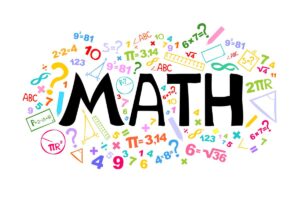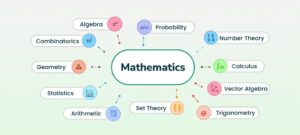Math Olympiads are designed to enhance students’ problem-solving skills, logical thinking, and mathematical creativity. They provide an opportunity to explore mathematics beyond the standard curriculum and prepare for international competitions like the HIBA International Math Olympiad (HIMO). From Grade 1 to Grade 12, each level introduces increasingly complex topics, paired here with math sample questions to illustrate the type of challenges students may face.
Grade 1: Building Foundations in Numbers and Logic
Key Topics:
-
Addition and subtraction of small numbers
-
Understanding numbers up to 100
-
Patterns and sequences
-
Introduction to basic geometry
-
Measurement: length, weight, time
Sample Questions:
-
What is 7 + 5?
-
Circle the shape that has 3 sides: □ △ ○
-
If you have 10 apples and eat 3, how many apples are left?
Grade 2: Strengthening Numerical and Pattern Recognition Skills
Key Topics:
-
Addition, subtraction, multiplication, division
-
Place value and number comparison
-
Simple fractions
-
Basic geometry: symmetry and polygons
-
Time and money problems
Sample Questions:
-
What is 12 × 2?
-
Which number is greater: 47 or 74?
-
If a pizza is cut into 4 pieces and you eat 1, what fraction of the pizza is left?
Grade 3: Expanding Problem-Solving and Introduction to Fractions
Key Topics:
-
Multiplication and division with larger numbers
-
Fractions and decimals
-
Patterns and sequences
-
Geometry: perimeter and area of 2D shapes
Sample Questions:
-
Find 36 ÷ 6.
-
What fraction of the rectangle is shaded if 3 out of 8 squares are colored?
-
A rectangle has a length of 5 cm and a width of 3 cm. What is its perimeter?
Grade 4: Preparing for Advanced Thinking
Key Topics:
-
Multi-digit multiplication and division
-
Fractions, decimals, and percentages
-
Factors, multiples, and prime numbers
-
Basic algebra: simple equations
Sample Questions:
-
Solve for x: x + 7 = 12
-
What is 25% of 80?
-
List all prime numbers between 10 and 30.
Grade 5: Developing Analytical and Logical Reasoning
Key Topics:
-
Advanced fractions, decimals, percentages
-
Ratio and proportion
-
Introduction to negative numbers
-
Geometry: volume, 3D shapes
-
Number theory: divisibility rules
Sample Questions:
-
If 3 pencils cost $9, how much do 7 pencils cost?
-
Solve: -5 + 12 = ?
-
Find the volume of a cube with side length 4 cm.
Grade 6: Exploring Patterns, Algebra, and Complex Geometry
Key Topics:
-
Algebra: simple equations and inequalities
-
Ratio, proportion, and rates
-
Number theory: GCD and LCM
-
Geometry: area, perimeter, angles
-
Introduction to probability
Sample Questions:
-
Solve for x: 2x + 5 = 15
-
Find the LCM of 12 and 18.
-
A coin is tossed. What is the probability of getting heads?
Grade 7: Strengthening Algebraic Thinking and Combinatorics
Key Topics:
-
Linear equations and inequalities
-
Coordinate geometry basics
-
Number theory: factors, multiples, prime numbers
-
Combinatorics and probability
Sample Questions:
-
Solve: 3x – 7 = 11
-
Find the coordinates of the midpoint between (2,3) and (6,7).
-
How many ways can 3 books be arranged on a shelf?
Grade 8: Advanced Problem Solving and Olympiad Techniques
Key Topics:
-
Algebra: expressions, equations, inequalities
-
Geometry: congruence, similarity, angles, circles
-
Number theory: primes, modular arithmetic
-
Combinatorics and probability
Sample Questions:
-
Solve for x: 5x + 3 = 2x + 18
-
Find the area of a triangle with base 6 cm and height 4 cm.
-
If a die is rolled, what is the probability of getting an even number?
Grade 9: Preparing for High-Level Competitions
Key Topics:
-
Quadratic equations, polynomials, systems of equations
-
Advanced geometry: Pythagoras theorem, 2D/3D shapes
-
Number theory: LCM/GCD, modular arithmetic
-
Combinatorics and probability
Sample Questions:
-
Solve: x² – 5x + 6 = 0
-
Find the length of the hypotenuse in a right triangle with sides 3 cm and 4 cm.
-
How many ways can 5 students be seated in a row?
Grade 10: Mastering Abstract and Olympiad-Level Concepts
Key Topics:
-
Algebra: quadratic equations, inequalities, sequences
-
Geometry: theorems, circles, triangles, polygons
-
Number theory: primes, divisibility, Diophantine equations
-
Combinatorics and probability
Sample Questions:
-
Solve: 2x² – 8x + 6 = 0
-
A circle has a radius of 7 cm. Find its circumference.
-
How many 3-digit numbers can be formed using digits 1, 2, 3, 4 without repetition?
Grade 11: High School Olympiad Preparation
Key Topics:
-
Algebra: polynomials, sequences, functions
-
Geometry: trigonometry, circles, polygons, 3D shapes
-
Number theory: Diophantine equations, modular arithmetic
-
Combinatorics and probability
Sample Questions:
-
Solve: x³ – 6x² + 11x – 6 = 0
-
Find the area of a triangle using Heron’s formula if sides are 7, 8, 9 cm.
-
A bag contains 5 red and 3 blue balls. Probability of picking a red ball?
Grade 12: Advanced Olympiad Skills and International Standards
Key Topics:
-
Algebra: polynomials, inequalities, sequences, complex numbers
-
Geometry: Euclidean geometry, trigonometry, 3D problems
-
Number theory: primes, modular arithmetic, Diophantine equations
-
Combinatorics and probability
Sample Questions:
-
Solve: x⁴ – 5x² + 4 = 0
-
Find the volume of a cone with radius 3 cm and height 4 cm.
-
How many ways can 5 people stand in line if two must be together?
Conclusion
From Grade 1 to Grade 12, math olympiads gradually introduce students to arithmetic, algebra, geometry, number theory, combinatorics, and probability. Sample questions give a glimpse of the type of critical thinking, logical reasoning, and problem-solving skills students develop. Competitions like HIBA International Math Olympiad (HIMO) provide students a chance to apply these skills globally, gain recognition, and prepare for higher education and STEM careers.





